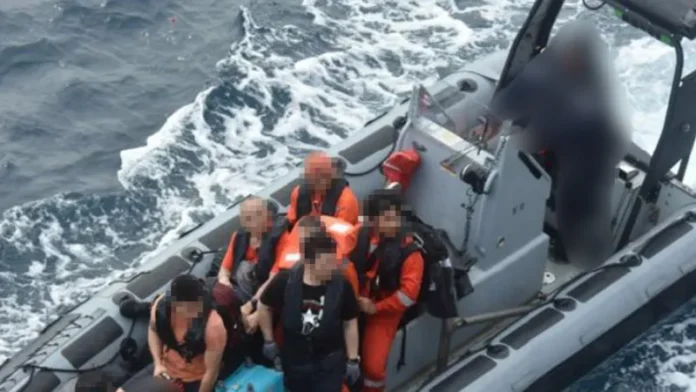In a dramatic maritime rescue operation on Wednesday, the crew of the Greek-owned oil tanker Sounion was successfully evacuated by a European warship following multiple attacks in the Red Sea.
The vessel, which was transporting 150,000 tonnes of crude oil, faced significant threats from hostile forces, sparking concerns over navigational safety and environmental hazards.
The incident unfolded 77 nautical miles (143 km) west of the Yemeni port of Hudaydah, where the Sounion came under fire from two small boats.
According to the UK Maritime Trade Operations (UKMTO), these boats fired at the tanker, initiating a series of violent events that escalated the situation.
Later in the day, the tanker was struck by three unidentified projectiles. These impacts ignited a fire on board and rendered the vessel powerless, leaving it adrift.
The nature of the projectiles and the identity of the attackers remain unclear, but US officials have attributed the aggression to Yemen-based Houthi rebels, who have been known for targeting shipping in the Red Sea.
In response to the escalating danger, the EU’s Red Sea naval mission intervened, with one of its ships successfully neutralizing an unmanned surface vessel (USV) that posed a further threat to the Sounion and its crew.
All 25 crew members, including those from Greece, Russia, and the Philippines, were rescued and transported to Djibouti, ensuring their safety.
“The MV Sounion now represents a navigational and environmental hazard,” EUNAVFOR warned in a statement. The organization emphasized the importance of caution in the region, urging all maritime operators to avoid actions that could worsen the situation.
The Greek tanker’s operator, Delta Tankers, confirmed that the fire on the Sounion had been extinguished before the crew abandoned the vessel.
The company is now working on a strategy to relocate the tanker to a safer location for further inspection and repairs. The vessel, initially left adrift after losing engine power, is now at anchor.
The attack on the Sounion is part of a broader pattern of aggression by the Houthi movement, which has escalated its operations against commercial shipping in the Red Sea and Gulf of Aden since November.
The Houthis, who are backed by Iran, claim their actions are in solidarity with Palestinians amid the ongoing conflict between Israel and Hamas. However, their attacks have targeted various international ships, often not directly connected to the conflict.
The involvement of the Houthis in this attack was corroborated by Deputy Pentagon Press Secretary Sabrina Singh, who criticized the group’s actions.
“I’m not exactly sure how [the attack] helps anyone in Gaza,” Singh remarked, highlighting that the ship was under a Greek flag and crewed by sailors from Russia and the Philippines.
The Sounion, a Suezmax tanker measuring 274 meters in length and 50 meters in width, was en route from the Iraqi port of Basra when it was struck.
EUNAVFOR noted that the vessel had not sought protection from its naval mission before the attack but had requested assistance once the situation became critical.
In addition to the attack on the Sounion, another maritime incident occurred on the same day. The Panama-flagged cargo vessel SW North Wind I reported three explosions in the water while navigating the Gulf of Aden, approximately 57 nautical miles south of Aden.
The explosions did not result in any casualties, and the vessel continued its journey to its next port of call. This incident recalls the June attack on the Liberian-flagged Greek-owned cargo ship Tutor, which sank after a Houthi USV attack, resulting in the death of one crew member.
The repeated assaults on commercial vessels in this region underscore the growing threat to maritime security and the necessity for continued vigilance.
The recent incidents highlight the urgent need for international cooperation to ensure the safety of maritime navigation and the protection of commercial shipping lanes.
As tensions in the region remain high, maritime authorities and naval missions are on heightened alert to safeguard both vessels and their crews from further threats.

